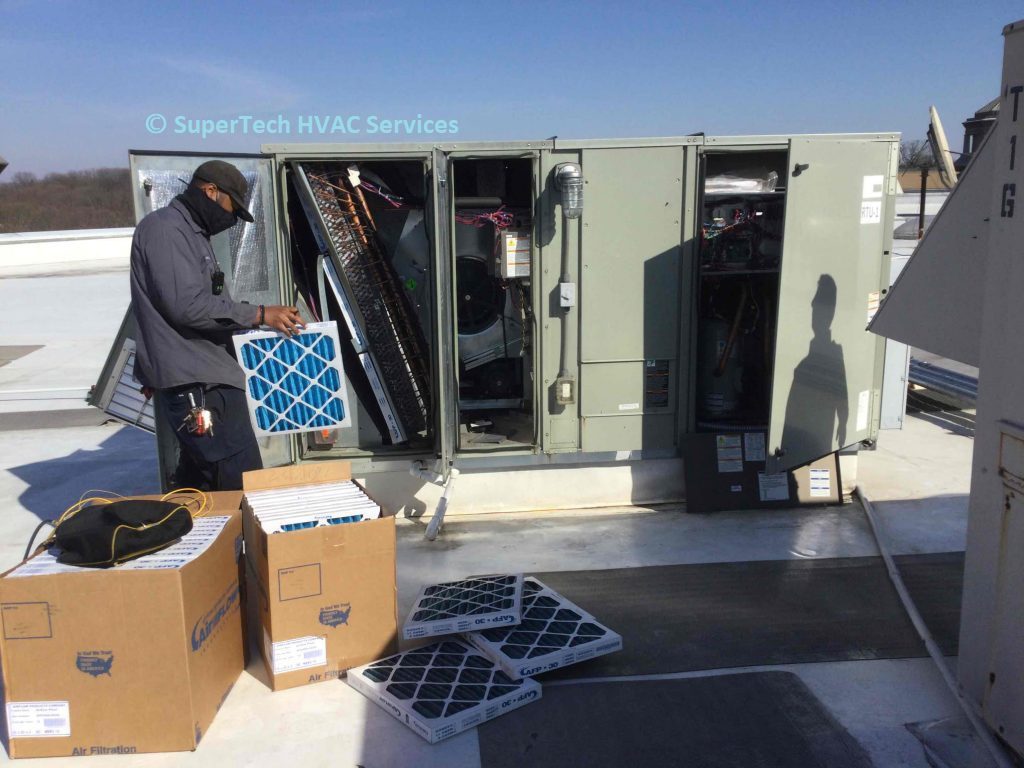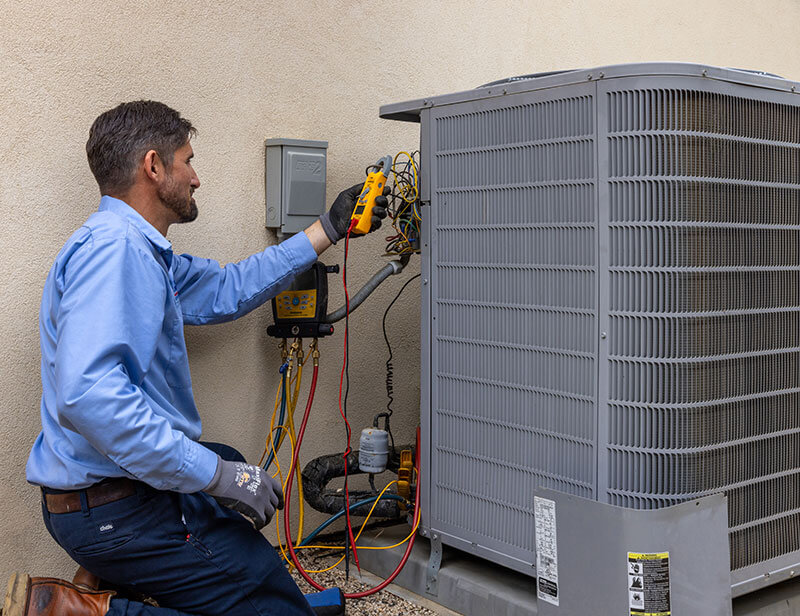Choosing In Between a Warmth Pump and Heating System: Trick Factors To Consider for Your HVAC Demands
When reviewing home heating options for HVAC requires, the decision between a heatpump and a heating system can be complicated. Each system offers distinct benefits tailored to details environments and energy efficiency goals. Understanding these distinctions is crucial for making an enlightened option. Trick aspects such as installation prices and environmental impact better complicate the selection procedure. Which choice genuinely aligns with one's comfort and sustainability preferences? The following sections will certainly explore these factors to consider thoroughly.
Understanding Warm Pumps: Exactly How They Work and Their Advantages
While many home owners think about numerous heating choices, understanding just how heatpump function and their advantages can greatly influence their decision. Heatpump run by transferring warm instead of producing it. In the winter, they remove heat from the outside air or ground and move it inside, while in the summer, they reverse this procedure, cooling down the home by removing warmth outside. This twin functionality makes them functional for year-round environment control.One of the main advantages of heatpump is their energy performance. They utilize substantially less power compared to standard heater, possibly resulting in lower utility bills (furnace replacement). Furthermore, warmth pumps have a smaller sized carbon impact, making them an environmentally friendly option. They additionally call for much less upkeep than conventional systems, contributing to long-term cost savings. In general, recognizing the technicians and benefits of heatpump can aid home owners make notified decisions concerning their heating and cooling down demands
Discovering Heating Systems: Kinds, Procedure, and Benefits
Heating systems are available in different types, including gas, electrical, and oil designs, each with unique operational mechanisms. Comprehending these differences is necessary, as they influence effectiveness and heating performance. Additionally, heating systems supply many advantages, such as regular warm output and integrity in chillier climates.
Sorts of Furnaces
Furnace can vary considerably in layout and operation, with heaters being a prominent selection amongst home owners. There are a number of sorts of heating systems, each making use of different gas sources and modern technologies. Gas furnaces prevail, leveraging natural gas to produce warm effectively. Electric heating systems, on the other hand, use electrical resistance to create warmth, usually preferred for their straightforward installation. Oil heating systems, while much less common, are effective in locations with restricted gas access (heat pump service). Furthermore, condensing heaters optimize power performance by capturing and reusing exhaust gases. Each kind operates via a system of heat exchangers and ductwork to distribute warm air throughout a home. Comprehending the differences in between these heating system kinds is vital for educated heating and cooling decisions
Advantages of Furnaces
For property owners seeking reputable heat throughout cool months, the advantages of furnaces are substantial. Furnaces provide constant home heating, ensuring also temperature levels throughout the home. They are especially effective in extreme cold, commonly exceeding heatpump in cold problems. Numerous types, including gas, electric, and oil furnaces, offer versatility to fulfill varied requirements and preferences.Furnaces additionally tend to have lower initial installment expenses contrasted to heatpump, making them a more available choice for lots of. Their durable style adds to a much longer life expectancy, with many units lasting over 15 years with correct maintenance. In addition, modern-day heating systems are usually outfitted with sophisticated technology for enhanced efficiency, which can cause minimized power expenses. On the whole, heating systems continue to be a reputable option for reliable home heating.

Energy Efficiency: Comparing Heat Pumps and Furnaces
When contrasting power effectiveness between heatpump and heaters, the Seasonal Energy Performance Ratio (SEER) plays a necessary role in figuring out efficiency. In addition, an operational price analysis reveals the long-lasting financial effects of each system. Recognizing these factors can assist homeowners in making informed decisions concerning their home heating services.
Seasonal Power Effectiveness Proportion
Power efficiency plays a necessary duty in the decision-making process between heatpump and heaters, specifically when considering the Seasonal Power Performance Proportion (SEER) This metric steps the cooling effectiveness of heatpump over a whole cooling period, offering a standardized means to examine performance. Greater SEER rankings suggest higher energy performance, converting to lower energy usage and decreased utility expenses. On the other hand, heaters are usually evaluated using the Yearly Fuel Use Efficiency (AFUE) rating, which reflects home heating effectiveness. When comparing these two systems, property owners should focus on SEER scores for heatpump, as they directly impact total power savings and environmental sustainability. A comprehensive understanding of SEER can significantly affect the long-term contentment and cost-effectiveness of the picked HVAC service.
Operational Cost Evaluation
Recognizing the functional prices connected with warm pumps and heaters is important for homeowners examining their alternatives. Warmth pumps usually supply greater energy effectiveness, transforming electric power into warmth with very little waste. This results in reduced monthly utility expenses, particularly in modest climates. Alternatively, typical furnaces, specifically gas versions, might have lower in advance expenses however can sustain greater operational expenses over time as a result of sustain prices and efficiency ratings.Moreover, heat pumps can operate as both home heating and cooling down systems, possibly decreasing the need for separate cooling and heating systems. While preliminary investments for heatpump might be greater, their long-term savings in energy performance can make them a much more cost-efficient choice for lots of homes. Cautious evaluation of regional energy rates is vital to identify the most effective option.
Installation Costs: What to Anticipate for Each Heater
Setup expenses for heater can differ considerably between warm pumps and heaters, affecting home owners' choices. Heatpump normally have greater upfront setup expenses, commonly varying from $3,500 to $8,000, depending on the unit size and intricacy of installment. This consists of the outside system, interior handling system, and required ductwork modifications. Conversely, heaters often tend to have lower initial prices, balancing between $2,500 and $6,000, which can be appealing for budget-conscious house owners. Installment costs can enhance if extensive ductwork is continue reading this required.Moreover, the option of fuel kind for heating systems-- all-natural gas, lp, or electric-- can additionally influence installment costs. While heat pumps use energy performance, their initial investment might discourage some purchasers. Inevitably, assessing installment prices together with lasting savings and performance will help home owners in making educated decisions regarding their furnace.
Environment Factors To Consider: Which System Does Better in Your Location
Exactly how do climate description problems influence the efficiency of heater? The efficiency of heat pumps and heating systems can differ considerably depending on the regional climate. In modest environments, heatpump stand out by efficiently transferring warmth from the outdoors air, making them an energy-saving choice. Nonetheless, their efficiency decreases in incredibly cool temperatures, where they might struggle to draw out sufficient warmth. Conversely, heating systems, specifically gas versions, provide regular and trustworthy heat despite outdoor problems, making them more effective in colder regions.In areas that experience milder wintertimes, heatpump can run successfully year-round, providing both heating & cooling. In comparison, areas with rough winters often gain from the effectiveness of heaters. Inevitably, comprehending the neighborhood environment is necessary when choosing between a warm pump and a furnace, as it directly impacts their functional effectiveness and overall efficiency.
Maintenance Demands: Long-Term Care for Warmth Pumps vs. Furnaces
While both heatpump and heaters require routine maintenance to assure peak efficiency, their details demands and treatment routines vary significantly. Heating systems normally require much less regular focus, with yearly evaluations sufficing to look for gas leaks, tidy filters, and assess overall capability. Their simpler design commonly allows for simple repairs.In contrast, warmth pumps require semiannual maintenance as a result of their double duty in heating and Get More Info air conditioning. This includes cleansing coils, examining cooling agent degrees, and making sure that both the outdoor and indoor units work at their ideal. Furthermore, heat pump maintenance commonly involves even more detailed components, making expert servicing essential.Neglecting upkeep can lead to diminished efficiency and increased energy costs for both systems. Inevitably, property owners need to take into consideration these lasting treatment needs when selecting in between a heatpump and a heater, as proactive upkeep can expand the life expectancy and performance of either system considerably.
Ecological Influence: Choosing a Sustainable Home Heating Choice
The environmental impact of heating systems is a critical evaluation for house owners seeking sustainable options. Warm pumps are generally a lot more energy-efficient than typical heating systems, as they transfer warm as opposed to generate it, substantially decreasing carbon exhausts. By making use of eco-friendly power sources, such as geothermal or air-source heatpump, property owners can additionally decrease their ecological footprint.On the other hand, gas heating systems send out greenhouse gases and contribute to air pollution, though they typically provide greater heat result. Nevertheless, innovations in technology have led to the development of high-efficiency furnaces that decrease emissions.Ultimately, picking a heating unit includes weighing efficiency versus environmental impact. Homeowners are urged to review neighborhood energy sources and motivations for eco-friendly systems, guaranteeing a selection that aligns with both individual convenience and ecological responsibility. The choice impacts not only prompt comfort but likewise long-term sustainability and ecological health.
Regularly Asked Concerns
For How Long Do Heat Pumps and Furnaces Typically Last?
The life-span of heatpump normally varies from 15 to twenty years, while furnaces can last between 15 to three decades. Routine upkeep significantly affects their durability and performance in providing home heating solutions.
Can I Make Use Of a Heatpump in Incredibly Cold Climates?
Heatpump can run in extremely chilly climates, yet their effectiveness reduces as temperatures decline. In such problems, additional heating sources may be necessary to maintain comfortable interior temperatures and guarantee peak efficiency.

What Is the Sound Degree of Heat Pumps Versus Furnaces?
The sound levels of warmth pumps and heating systems vary significantly. Usually, warm pumps run more quietly than standard heaters, making them preferable for those conscious seem, while heaters may create louder functional sounds during heating cycles.
Are Warm Pumps Suitable for Both Heating & Cooling?
Heatpump are certainly appropriate for both home heating and cooling (heat pump installation ooltewah tn). They function by transferring heat, supplying effective temperature level control year-round, making them a flexible choice for house owners looking for an all-in-one HVAC solution
What Size Heating Unit Do I Need for My Home?
Identifying the ideal dimension heater for a home requires examining variables such as square video footage, insulation quality, regional environment, and the home's design. Consulting an expert can guarantee an exact assessment and suitable comfort. Warm pumps generally supply higher energy effectiveness, converting electric power right into warm with minimal waste. In modest climates, warmth pumps stand out by efficiently transferring warm from the outdoors air, making them an energy-saving choice. On the other hand, furnaces, particularly gas models, supply constant and trusted warmth no matter of outdoor conditions, making them better in colder regions.In areas that experience milder wintertimes, warm pumps can run efficiently year-round, offering both heating and cooling. Warmth pumps are generally more energy-efficient than conventional heating systems, as they move heat instead than create it, considerably reducing carbon exhausts. By using renewable energy sources, such as geothermal or air-source heat pumps, homeowners can even more decrease their environmental footprint.On the various other hand, all-natural gas heating systems give off greenhouse gases and contribute to air pollution, though they often offer higher heat result.